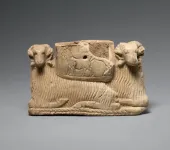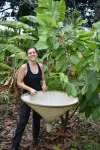(Press-News.org) New research uncovers the dual nature of scratching an itch; although it can worsen skin inflammation, it can also boost immune defenses against bacterial infections at the injury site. The findings shed light on a pharmacologically targetable pathway that explains how scratching triggers inflammation, resolving the paradox of scratching as both a harmful pathological process and a beneficial evolutionary adaptation. Scratching is a natural, instinctive response to the sensation of itching, and it plays a central role in many skin conditions and injuries, such as dermatitis and insect bites, where chronic itching can be a major source of discomfort. Scratching can aggravate the condition by promoting inflammation in a self-perpetuating "itch-scratch cycle," where the scratching intensifies the itch and can exacerbate the injury. Yet unlike pain, which typically causes an aversion response, scratching can feel pleasurable, which suggests it might serve some adaptive benefit. However, the mechanisms by which scratching contributes to skin inflammation and whether the itch-scratch reflex offers any benefits to the host remain poorly understood. Using a novel genetically modified mouse model, Andrew Liu and colleagues explored how eliminating the function of itch-sensing neurons called nonpeptidergic 2 (NP2) affects the connection between itch, scratch and inflammation. Liu et al. discovered that scratching activates pain-sensing neurons that release substance P (SP), which stimulates mast cells to increase inflammation, mainly by attracting neutrophils. However, while scratching can aggravate issues like dermatitis, it may also help host immune defense by reducing bacteria, such as Staphylococcus aureus, during infections. Moreover, scratching can influence the skin's microbiome at the injury site, potentially preventing microbiota imbalances, although chronic conditions like atopic dermatitis complicate this. According to the authors, the findings suggest that scratching serves both as a pathological driver of inflammation and an evolutionary mechanism to bolster protection against infection. “Beyond defining a previously unidentified neuroimmune itch-scratch circuit, the findings of Liu et al. may lay a foundation for discoveries to help people suffering from chronic itch,” writes Aaron Ver Heul in a related Perspective.
Podcast: A segment of Science's weekly podcast with Daniel Kaplan, related to this research, will be available on the Science.org podcast landing page after the embargo lifts. Reporters are free to make use of the segments for broadcast purposes and/or quote from them – with appropriate attribution (i.e., cite "Science podcast"). Please note that the file itself should not be posted to any other Web site.
END
Scratching an itch promotes antibacterial inflammation
Summary author: Walter Beckwith
2025-01-30
ELSE PRESS RELEASES FROM THIS DATE:
Drivers, causes and impacts of the 2023 Sikkim flood in India
2025-01-30
In a comprehensive analysis, researchers present the divers, causes, and impacts of the catastrophic 2023 Sikkim glacial lake outburst flood (GLOF). The findings stress the urgent need to enhance GLOF hazard assessments and improve prediction and early warning systems as melting glaciers steadily raise the risk of GLOFs in the Himalayan region. South Lhonak Lake – perched at 5200 meters above sea level in the Upper Teesta basin of Sikkim, India – is among the region's largest and most rapidly expanding glacial lakes, posing severe hazards due to its ...
Most engineered human cells created for studying disease
2025-01-30
The most complex engineering of human cell lines ever has been achieved by scientists, revealing that our genomes are more resilient to significant structural changes than was previously thought.
Researchers from the Wellcome Sanger Institute, Imperial College London, Harvard University in the US and their collaborators used CRISPR prime editing to create multiple versions of human genomes in cell lines, each with different structural changes. Using genome sequencing, they were able to analyse the genetic effects of these structural variations on cell survival.
The research, published today (30 January) in Science, ...
Polar bear population decline the direct result of extended ‘energy deficit’ due to lack of food
2025-01-30
U of T Scarborough researchers have directly linked population decline in polar bears living in Western Hudson Bay to shrinking sea ice caused by climate change.
The researchers developed a model that finds population decline is the result of the bears not getting enough energy, and that’s due to a lack of food caused by shorter hunting seasons on dwindling sea ice.
“A loss of sea ice means bears spend less time hunting seals and more time fasting on land,” says Louise Archer, a U of T Scarborough postdoc and lead author of the study.
“This negatively affects the bears’ energy ...
Lifecycle Journal launches: A new vision for scholarly publishing
2025-01-30
(Charlottesville, VA, Jan. 30, 2025) – The Center for Open Science (COS) is excited to announce that Lifecycle Journal, a 3-year research and development pilot on a new model of scholarly communication, is now open for submissions. Lifecycle Journal reimagines scholarly publishing in line with scholarly values of rigor, transparency, sharing, correction, and community evaluation. Lifecycle Journal offers a dynamic, community-driven approach to scholarly publishing, providing a new experience for authors, reviewers, and readers to critically engage with research throughout the entire research lifecycle.
The traditional ...
Ancient DNA analyses bring to life the 11,000-year intertwined genomic history of sheep and humans
2025-01-30
Sheep have been intertwined with human livelihoods for over 11,000 years. As well as meat, their domestication led to humans being nourished by their protein-rich milk and clothed by warm, water-resistant fabrics made from their wool.
Now, an international and interdisciplinary team of researchers led by geneticists from Trinity College Dublin and zooarchaeologists from LMU Munich and the Bavarian State Collections of Natural History (SNSB) has deciphered the prehistoric cultural trajectory of this species by analysing 118 genomes recovered from archaeological bones dating across 12 millennia and stretching from Mongolia to ...
Climate change increases risk of successive natural hazards in the Himalayas
2025-01-30
An international study has investigated the causes and impacts of the devastating flood disaster in the Himalayas in October 2023, which destroyed large areas along and surrounding the Teesta River in Sikkim, India. A research team from nine countries, including researchers from the University of Zurich (UZH), analyzed the complex drivers, causes and consequences of this flood cascade and reconstructed the exact time of its onset.
Massive damage caused by tsunami wave
On 3 October 2023, approximately 14.7 million cubic meters of frozen ...
From bowling balls to hip joints: Chemists create recyclable alternative to durable plastics
2025-01-30
ITHACA, N.Y. – Cornell University researchers have developed a recyclable alternative to a durable class of plastics used for items like car tires, replacement hip joints and bowling balls.
Known as thermosets, this type of plastic boasts a “crosslinked polymer” chemical structure that guarantees longevity but has also made these petrochemical-based materials – which comprise 15%-20% of all polymers produced – impossible to recycle.
“Currently, zero percent of the world’s thermoset materials are recycled – they’re either incinerated ...
Promoting cacao production without sacrificing biodiversity
2025-01-30
The productivity of cacao trees decreases with time, forcing farmers to renew their plantations by either cutting down the old trees or establishing a new crop elsewhere. Frequently, new plantations are established in areas of the forest that are thinned out to accommodate new, young cacao trees. However, this comes with high economic and ecological costs. An alternative approach is to graft highly productive and native cultivars onto the existing older cacao trees. An international team led by scientists of the University of Göttingen found that cacao grafting is a useful measure to rejuvenate cacao plants, increasing their yield and profits with minimal impact on biodiversity. The ...
New £2 million project to save UK from food shortages
2025-01-30
Anglia Ruskin University (ARU) is leading a new £2 million initiative to help prevent food shortages that could potentially trigger civil unrest in the UK.
The project, called Backcasting to Increase Food System Resilience in the UK, is being led by experts from Anglia Ruskin’s Global Sustainability Institute and has received £2,048,461 in funding from the Biotechnology and Biological Sciences Research Council, part of UK Research and Innovation (UKRI).
Building on recent research that found that over 40% of food experts believe widespread civil unrest linked to food shortages, such as demonstrations and violent looting, is possible or likely in the UK within the next 10 ...
SCAI mourns Frank J. Hildner, MD, FSCAI: A founder and leader
2025-01-30
The Society for Cardiovascular Angiography and Interventions (SCAI) and the interventional cardiology community mourn the passing of Frank J. Hildner, MD, FSCAI, a founding member and past president (1989-90) of SCAI.
“Dr. Frank Hildner laid the foundation for SCAI’s growth and success. His visionary leadership helped guide SCAI through its formative years, ensuring it would become the trusted home for interventional cardiology. We are deeply grateful for his contributions and will continue to honor his legacy,” said SCAI President James B. Hermiller, MD, MSCAI.
Recognizing the need for a dedicated platform for interventional cardiologists, Dr. ...
LAST 30 PRESS RELEASES:
Novel camel antimicrobial peptides show promise against drug-resistant bacteria
Scientists discover why we know when to stop scratching an itch
A hidden reason inner ear cells die – and what it means for preventing hearing loss
Researchers discover how tuberculosis bacteria use a “stealth” mechanism to evade the immune system
New microscopy technique lets scientists see cells in unprecedented detail and color
Sometimes less is more: Scientists rethink how to pack medicine into tiny delivery capsules
Scientists build low-cost microscope to study living cells in zero gravity
The Biophysical Journal names Denis V. Titov the 2025 Paper of the Year-Early Career Investigator awardee
Scientists show how your body senses cold—and why menthol feels cool
Scientists deliver new molecule for getting DNA into cells
Study reveals insights about brain regions linked to OCD, informing potential treatments
Does ocean saltiness influence El Niño?
2026 Young Investigators: ONR celebrates new talent tackling warfighter challenges
Genetics help explain who gets the ‘telltale tingle’ from music, art and literature
Many Americans misunderstand medical aid in dying laws
Researchers publish landmark infectious disease study in ‘Science’
New NSF award supports innovative role-playing game approach to strengthening research security in academia
Kumar named to ACMA Emerging Leaders Program for 2026
AI language models could transform aquatic environmental risk assessment
New isotope tools reveal hidden pathways reshaping the global nitrogen cycle
Study reveals how antibiotic structure controls removal from water using biochar
Why chronic pain lasts longer in women: Immune cells offer clues
Toxic exposure creates epigenetic disease risk over 20 generations
More time spent on social media linked to steroid use intentions among boys and men
New study suggests a “kick it while it’s down” approach to cancer treatment could improve cure rates
Milken Institute, Ann Theodore Foundation launch new grant to support clinical trial for potential sarcoidosis treatment
New strategies boost effectiveness of CAR-NK therapy against cancer
Study: Adolescent cannabis use linked to doubling risk of psychotic and bipolar disorders
Invisible harms: drug-related deaths spike after hurricanes and tropical storms
Adolescent cannabis use and risk of psychotic, bipolar, depressive, and anxiety disorders
[Press-News.org] Scratching an itch promotes antibacterial inflammationSummary author: Walter Beckwith





